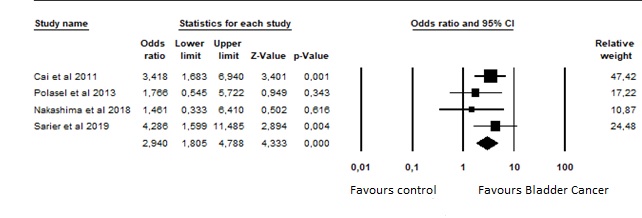Back
Poster, Podium & Video Sessions
Moderated Poster
MP42: Bladder Cancer: Epidemiology & Evaluation II
MP42-02: Urinary human papilloma virus infection and bladder cancer risk: A systematic review and a PRISMA-compliant meta-analysis.
Sunday, May 15, 2022
10:30 AM – 11:45 AM
Location: Room 225
Dario Garcia-Rojo*, Jesus Muñoz-Rodriguez, Clara Centeno, Angel Prera, Carlos Abad, Eduardo Vicente, Jose Luis Gonzalez-Sala, Naim Hannaoui, Arturo Dominguez-Garcia, Marta Capdevila, Leticia de Verdonces, Anna Ferran, Carmina Pla, Paula Azuara, Silvia Cuadrench, Maria Eugenia Zegri, Juan Prats, Sabadell, Spain
- GD
Poster Presenter(s)
Introduction: Association between human papilloma virus (HPV) infection and risk of bladder cancer (BlCa) remain inconclusive. We carried out a systematic review and a PRISMA-compliant meta-analysis of the available case-control studies in order to verify possible differences in the occurrence of HPV infection in urine samples in patients with BlCa and normal subjects.
Methods: A systematic review of the literature and a PRISMA-compliant meta-analysis was performed using the PICO method with the aim of answering the following clinical question: "Is urinary infection with HPV a risk factor for the development of a BlCa?" . PubMed was used to search for articles published from January 1965 to October 2021 using the key words "bladder cancer" and "human papilloma virus". Case-control studies reporting Odds Ratio (OR) for HPV infection in urine samples in patients with BlCa and and normal subjects were analyzed. The quality of the studies was evaluated by the New Castle Ottawa scale. Data were combined using random effect models. The Cochrane ?2 (Cochrane Q) statistic and the I2 test were used to analyze heterogeneity. The publication bias was graphically explored through funnel plot, and Duval and Tweedie 's ?trim-and-fill? test was used to correct possible publication bias.
Results: Among 251 articles, 35 were selected to be fully read. The selection process yielded four case-control studies with eligibly criteria for analysis, that gave information on 150 patients with HPV infection in urine and 1259 patients without HPV infection in urine. The quality scores according to the New Castle-Ottawa scale of all included studies were 9, suggesting that all included studies were eligible for synthesized analysis. The pooled OR estimated showed that patients with HPV infection in urine exhibit a significantly higher prevalence in BlCa than patients without HPV infection (OR = 2.94, 95%CI: 1.805, 4.788; p= 0.002). We obtained a heterogeneity ?2value Q exp=2.317 (p=0.509) (I2 = 0%). Funnel plot not suggested a possible publication bias in the analysis.
Conclusions: The pooled OR value showed a moderate relationship between urinary HPV infection and BlCa risk. HPV infection in the urine may have a role in carcinogenesis of the bladder tumor.
Source of Funding: none

Methods: A systematic review of the literature and a PRISMA-compliant meta-analysis was performed using the PICO method with the aim of answering the following clinical question: "Is urinary infection with HPV a risk factor for the development of a BlCa?" . PubMed was used to search for articles published from January 1965 to October 2021 using the key words "bladder cancer" and "human papilloma virus". Case-control studies reporting Odds Ratio (OR) for HPV infection in urine samples in patients with BlCa and and normal subjects were analyzed. The quality of the studies was evaluated by the New Castle Ottawa scale. Data were combined using random effect models. The Cochrane ?2 (Cochrane Q) statistic and the I2 test were used to analyze heterogeneity. The publication bias was graphically explored through funnel plot, and Duval and Tweedie 's ?trim-and-fill? test was used to correct possible publication bias.
Results: Among 251 articles, 35 were selected to be fully read. The selection process yielded four case-control studies with eligibly criteria for analysis, that gave information on 150 patients with HPV infection in urine and 1259 patients without HPV infection in urine. The quality scores according to the New Castle-Ottawa scale of all included studies were 9, suggesting that all included studies were eligible for synthesized analysis. The pooled OR estimated showed that patients with HPV infection in urine exhibit a significantly higher prevalence in BlCa than patients without HPV infection (OR = 2.94, 95%CI: 1.805, 4.788; p= 0.002). We obtained a heterogeneity ?2value Q exp=2.317 (p=0.509) (I2 = 0%). Funnel plot not suggested a possible publication bias in the analysis.
Conclusions: The pooled OR value showed a moderate relationship between urinary HPV infection and BlCa risk. HPV infection in the urine may have a role in carcinogenesis of the bladder tumor.
Source of Funding: none


.jpg)
.jpg)